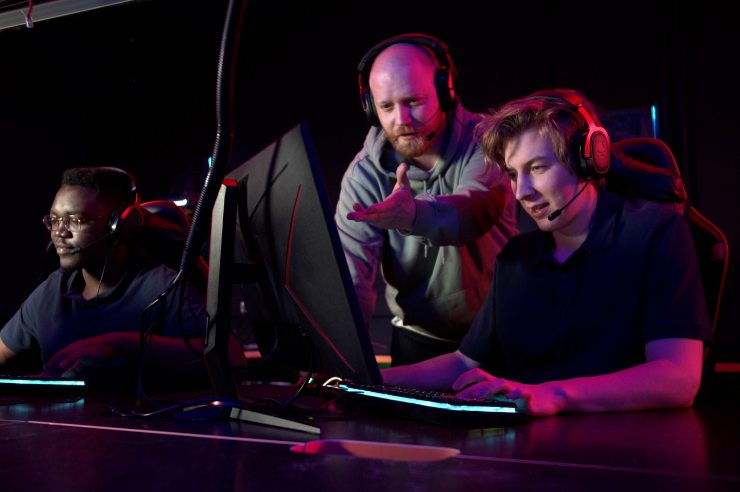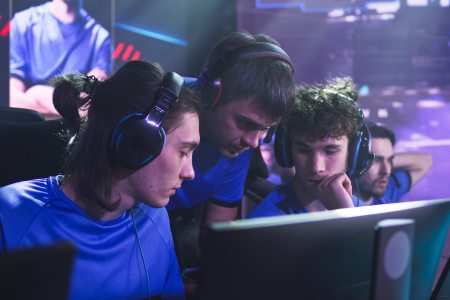
Performance coaches have become essential in the fast-paced world of esports, where split-second decisions and high-pressure situations can make or break a game. So what do performance coaches do in esports?
Esports coaches play a crucial role in helping esports athletes optimize their gameplay and mental, physical, and strategic well-being. Coaching esports goes beyond teaching mechanics or game-specific strategies—it’s about preparing players to handle stress, maintain focus, and work as a cohesive unit, even in the most intense moments.
In this post, we’ll explore what exactly a performance coach does in esports and why their role is so valuable. We’ll also dive into what it takes to become an esports coach, covering the qualifications, skills, and steps needed to succeed in this rapidly growing industry. Whether you’re considering a career in video game coaching or just curious about the behind-the-scenes support these athletes receive, this guide will provide a clear path to understanding and pursuing this exciting career.
What Do Performance Coaches Do in Esports?
Esports coaches focus on players’ overall well-being, helping them perform at their best in every aspect of the game. Unlike game-specific coaches who concentrate on refining a team’s strategies and mechanics, performance coaches look at the bigger picture. Their job is to ensure that players are mentally and physically prepared to handle the rigors of competitive gaming.
Maintaining mental focus and physical health is essential in esports, where players often face long hours of practice and intense competition. Performance coaches step in to help with areas like mental resilience, stress management, and even physical fitness, all of which are key to a player’s long-term success. Esports coaches work on building a strong, unified team culture, making sure that players communicate effectively and support one another during high-pressure situations. By focusing on the holistic performance of the team, performance coaches play an invaluable role in keeping players at their peak, both in and out of the game.
Understanding the Role of an Esports Coach
The daily tasks of an esports coach are varied and go far beyond gameplay. One of their primary responsibilities is helping players develop mental skills that enable them to stay calm and focused during matches. This includes teaching techniques for managing stress, handling pressure, and improving concentration, which are crucial in high-stakes environments.
In addition to mental training, performance coaches work on team dynamics. They ensure that players communicate effectively, resolve conflicts, and work together as a cohesive unit. Team synergy can often make the difference between winning and losing, so fostering a positive and collaborative atmosphere is key.
Physical fitness is another area of focus, though it’s tailored to the specific needs of esports athletes. Esports coaches may recommend exercises to reduce fatigue, improve posture, or enhance reflexes, all of which can impact in-game performance. Overall, performance coaches help players build psychological resilience, ensuring they can stay sharp and maintain their edge, even under the intense pressure of competitive gaming.
How To Become an Esports Coach

Becoming an esports coach involves developing a mix of skills, knowledge, and experience tailored to the unique demands of competitive gaming. The path to a career in coaching esports starts with understanding the qualifications you’ll need and finding ways to stand out in this growing field.
One of the first steps is to build a strong foundation in both the gaming world and the broader principles of performance coaching. Many successful esports coaches have backgrounds in sports psychology, physical training, or education, which helps them understand how to enhance players’ mental and physical well-being. On top of this, gaining experience in esports—whether as a player, coach, or analyst—can significantly boost your credibility.
Networking is also crucial. The esports industry is highly competitive, and building connections with teams, players, and other professionals can open up new opportunities in esports. Participating in esports communities, attending industry events, and collaborating with amateur teams are all excellent ways to build your reputation. With esports continuing to expand, the demand for esports coaches is growing, so by acquiring the right skills and establishing your presence in the community, you can set yourself apart in the field.
Educational Requirements for Esports Coaches
While there’s no single degree that guarantees a career in coaching esports, certain educational backgrounds can give you a decisive advantage. Many esports coaches have degrees in fields like sports psychology, kinesiology, or physical education, which equip them with the knowledge to improve mental and physical performance. For instance, understanding how the body and mind work under stress can help you develop effective strategies to keep players calm and focused during matches.
It’s also valuable to have a deep understanding of esports itself. Familiarity with specific games, the esports ecosystem, and insights into traditional sports allows you to combine the best practices from both fields. Whether analyzing a player’s physical endurance or coaching them on mental resilience, having this broad knowledge base will make you a more effective and versatile coach.
Gaining Experience as an Esports Coach
Hands-on experience is one of the best ways to break into the esports coaching field. Interning with esports organizations or working with amateur teams allows you to apply coaching techniques in real-world settings. By participating in online tournaments, local events, or even joining grassroots esports communities, you can work directly with players, learn how teams operate, and develop your own coaching style.
Networking is equally important. The esports industry thrives on relationships, so building connections with players, managers, and other esports coaches can help you find new opportunities. Attend industry events, engage with the esports community on social media, and join coaching or gaming forums where professionals share insights. These interactions can lead to mentorship opportunities or job leads, giving you an edge in a competitive field. The more experience and connections you gather, the better positioned you’ll be to launch a successful career as an esports coach.
Esports Coach Job Description
An esports coach wears many hats, combining technical knowledge with strong communication skills and psychological insight to bring out the best in their players. The core responsibility of an esports coach is to help players refine their strategies and improve their overall performance, both individually and as a team. This means working closely with players to analyze gameplay, identify areas for improvement, and develop strategies that can give the team a competitive edge.
But coaching esports isn’t just about gameplay mechanics. A great esports coach also acts as a leader, fostering team cohesion and keeping players focused, especially during high-pressure competitions. Esports coaches must manage team dynamics, resolve conflicts, and maintain a positive atmosphere that encourages growth and collaboration. Their leadership is crucial in helping players stay calm and focused, ensuring everyone performs at their best when it matters most.
Key Skills for a Successful Esports Coach
Effective esports coaches help their players excel by utilizing a variety of key skills:
- Communication: Clear communication is essential for guiding players and ensuring everyone is on the same page during practice and competitions.
- Team Management: Esports coaches need to understand how to manage different personalities, handle conflicts, and keep the team functioning as a cohesive unit.
- Mental Toughness: Esports competitions can be intense, and a coach must be able to help players manage stress, stay focused, and remain calm under pressure.
- Gameplay Analysis: The ability to break down gameplay, identify weaknesses, and suggest improvements is critical for developing effective strategies.
- Decision-Making: Esports coaches are often responsible for making quick decisions during matches, so it’s essential for them to be able to think clearly and make smart calls in high-stress situations.
With the esports industry rapidly growing, there’s an increasing demand for esports coaches who can help players not only improve their skills but also enhance their endurance, focus, and decision-making during tough matches. By mastering skills such as these, you’ll set yourself apart from the competition as a skillful and effective esports coach.
Certifications and Further Learning for Esports Coaching
While not always required, earning certifications can significantly boost your credibility as an esports coach. Certifications in sports psychology, physical conditioning, or gaming analytics demonstrate that you have a solid understanding of how to optimize mental and physical performance.
For example, certifications in sports psychology can help you guide players through mental challenges and improve their focus during high-pressure situations. Physical conditioning courses can give you the tools to recommend exercises that enhance players’ endurance and prevent fatigue. Additionally, gaming analytics certifications can help you gain deeper insights into player performance and strategy. Continuously learning and staying up-to-date with the latest coaching techniques will set you apart in this competitive field.
How Much Do Esports Coaches Make?

Salaries for esports coaches can vary significantly depending on several factors, including experience, the reputation of the team, and geographical location. On average, esports coaches can expect to earn anywhere from $55,500 to $67,500 per year, with some earning even more depending on the level of competition they’re coaching in. Entry-level coaches working with amateur or semi-professional teams typically earn on the lower end of the scale, while experienced coaches working with top-tier teams can command much higher salaries.
Freelance coaches often have more flexible income, but their earnings can be less stable. In contrast, coaches employed full-time by established esports organizations tend to enjoy more consistent pay and benefits such as job security and additional perks. As esports continues to grow, the demand for skilled coaches is rising, which could further drive up salaries across the industry.
Esports Coach Salary and Job Outlook
For entry-level esports coaches, salaries usually start around $30,000 to $40,000 annually. This is typically the case for coaches working with smaller teams or in less competitive leagues. However, as you gain experience and move up to higher levels of competition, your earning potential can increase significantly. Coaches for top-tier professional teams in popular games like League of Legends or Counter-Strike can earn upwards of $90,000 or more annually, especially if they’re part of a successful team.
The job outlook for esports coaches is promising as the industry continues to expand and become more professional. With the growing number of esports tournaments, leagues, and organizations around the world, there are more opportunities than ever for esports coaches. As teams recognize the importance of performance coaching, the role of the esports coach is becoming a staple in the competitive gaming scene, offering career growth potential for those with the right skills and experience.
Factors That Influence an Esports Coach’s Salary
Several key factors can impact how much an esports coach earns:
- Team Success/Reputation: Esports coaches who lead successful teams that consistently place high in tournaments often see a boost in salary. Teams that win major championships or have a strong reputation tend to offer higher pay to retain their coaching talent.
- Experience: Like many professions, the more experience you have as an esports coach, the higher your earning potential. Esports coaches with years of experience working with top-level teams or who have built a track record of success will generally command higher salaries than those just starting out.
- Geographical Location: Salaries can also vary depending on the region. Esports coaches working in regions where esports is highly developed, such as North America or Europe, tend to earn more than those in less established markets.
While offering flexibility, freelance esports coaches may have fluctuating incomes based on the teams they work with and the demand for their services. Full-time employment with an esports team or organization provides a more consistent paycheck and can include benefits like health insurance and bonuses based on team performance. All these factors combined make salary expectations in esports coaching highly variable but also full of potential for growth.
Career Paths in Esports Coaching
Esports coaching offers a variety of career paths, depending on your interests and expertise. The most common route is working with professional teams, helping players refine their strategies, build teamwork, and improve their overall performance in tournaments. Many esports coaches start with amateur or semi-professional teams, gaining experience and building their reputation before moving up to top-tier organizations.
However, esports coaching isn’t limited to pro teams. Esports coaches are also in demand at gaming organizations that focus on player development, training, and performance management. Some esports coaches work behind the scenes at streaming platforms, helping content creators enhance their gameplay for a wider audience. Another exciting alternative is video game coaching for individuals or small groups of players, including those who want to improve their skills for casual or competitive play. This can be done through one-on-one sessions or by joining larger esports coaching platforms where players seek out expert advice.
With the esports industry continuing to grow, there are plenty of opportunities for esports coaches to find rewarding careers across different sectors of the gaming world.
Exploring Esports Coach Jobs
Esports coaching involves a range of specialized roles, each contributing to different aspects of a team’s success. The head coach is the leader of the esports coaching staff and is responsible for overseeing the team’s overall strategy. They set goals, create practice schedules, and ensure smooth communication among players and coaches. With a broad understanding of the game and team dynamics, the head coach shapes the team’s vision and approach to competition.
A strategic coach plays a more focused role by analyzing opponents and developing in-depth game plans. They help the team prepare for matches by studying playstyles, adapting strategies based on the current game meta, and guiding the players through draft selections. Their expertise lies in macro-level decisions that influence the team’s overall gameplay.
The mental coach ensures players are mentally and emotionally prepared for competition, helping them build resilience, manage stress, and stay focused under pressure. Mental coaches also assist with team-building, improving communication, and resolving conflicts, ensuring the team works cohesively in and out of the game.
Each esports coaching role is vital in shaping a team’s performance, and aspiring esports coaches can find fulfilling careers by choosing the path that aligns with their strengths and interests.
Launch Your Esports Coaching Career with JobsinSports.com
Ready to take the next step toward becoming an esports coach? JobsinSports.com is your go-to resource for finding the latest job listings and career opportunities in the sports industry. Whether you’re just starting out or looking to advance to a top-tier coaching position, the platform offers a variety of tools to help you succeed.
You can explore job boards dedicated to esports coaching positions, sign up for updates on new job opportunities, and find helpful information and career advice through the platform’s online blog. JobsinSports.com also provides professional networking options, allowing you to connect with industry professionals who can help you build your reputation and land your dream esports coaching job.
If you’re serious about launching or advancing your esports coaching career, JobsinSports.com has everything you need to get started. Sign up today and take your first step toward achieving your dream esports coach career!





